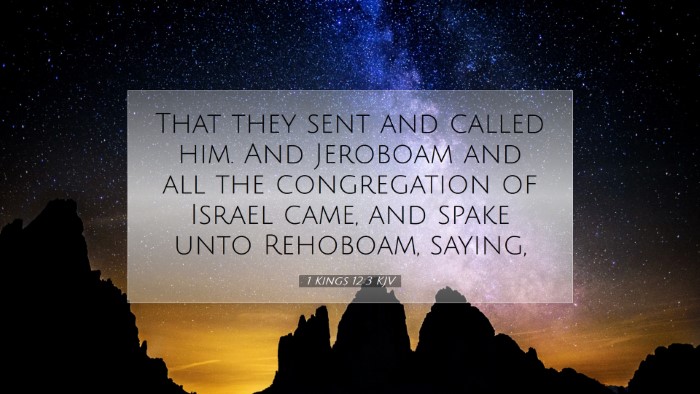Commentary on 1 Kings 12:3
Verse: "That they sent and called him unto Jeroboam; and all the congregation of Israel came, and spake unto Rehoboam, saying."
Introduction
The event captured in 1 Kings 12:3 represents a pivotal moment in the history of Israel. This passage describes the assembly of the people of Israel who call upon Rehoboam, the son of Solomon, to hear their grievances. This request sets the stage for the division of the kingdom and reveals the complexities of leadership, authority, and the people's desires.
Historical Context
The context of 1 Kings 12 is crucial for understanding the implications of this verse. Rehoboam ascends to the throne after the death of his father, Solomon, whose reign was marked by wealth and wisdom but also by heavy taxation and forced labor. The people's dissatisfaction is palpable as they seek relief from these burdens.
- Transition of Power: The transition from Solomon to Rehoboam occurs during a period of political unrest.
- Jeroboam's Role: Jeroboam, who previously fled to Egypt, returns as a leader advocating for the people's rights. His influence is significant in gathering the assembly.
- Political Dynamics: The tensions between the northern tribes and the southern kingdom of Judah are foreshadowed here, leading to a historic schism.
Commentary Insights
This verse encompasses themes of leadership, accountability, and communal responsibility. The comments from various biblical scholars shed light on different aspects.
Matthew Henry's Commentary
Henry emphasizes the people's initiative in addressing their concerns with their new king. He notes that the call for Rehoboam signifies a structured approach to governance, where the subjects seek to address grievances rather than resorting to rebellion. Henry points out that this act is both wise and necessary, as it demonstrates the people's desire for a ruler who is responsive to their needs.
Albert Barnes' Notes
Barnes highlights the implications of this assembly, noting that it signifies a form of collective leadership. He discusses how the representatives of Israel took the initiative to reach out to Rehoboam, showcasing their agency in the political process. Barnes also points to the importance of listening in leadership, warning against dismissing public sentiment.
Adam Clarke's Commentary
Clarke provides insights into the character of the individuals involved, particularly Rehoboam. He notes that as a young king, Rehoboam must navigate complex relationships and prove himself to his subjects. Clarke remarks on the significance of Jeroboam's leadership in mobilizing the people and how this foreshadows future conflicts.
Theological Reflections
The narrative in 1 Kings 12:3 invites theological reflection on the nature of authority and the responsibility of leaders. The assembly of the congregation highlights the expectation that leaders should genuinely consider the voices of the people they serve.
- Leadership and Servanthood: A leader's role is to reflect the heart of God in serving His people, showing that true authority is intertwined with service.
- Divine Sovereignty vs. Human Agency: The convergence of human choices and divine providence is a recurrent theme in this account.
- Community and Accountability: The call for Rehoboam demonstrates a model of accountability where leaders must be responsive to their constituents.
Lessons for Leaders
This verse imparts critical lessons for pastors, theologians, and spiritual leaders today:
- Responsive Leadership: Leaders must remain open to hearing and addressing the concerns of their communities.
- Importance of Dialogue: Engaging in conversation with followers fosters mutual understanding and respect.
- Seeking Wisdom: Leaders are encouraged to seek divine wisdom in decision-making, especially when facing pressures from their congregations.
Conclusion
1 Kings 12:3 serves as a crucial reminder of the dynamics of power, leadership, and community in the biblical narrative. The assembly of Israel before Rehoboam highlights the intricate relationship between a king and his subjects. As scholars and theology practitioners engage with this passage, it calls for reflection on how contemporary leaders can embody the values of accountability, wisdom, and service that are foundational in the life of the faith community.


